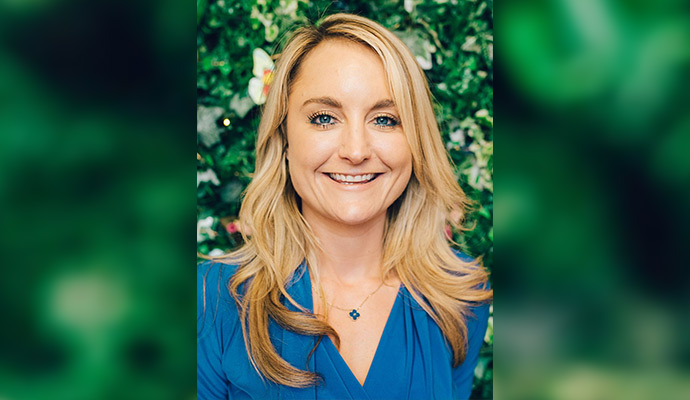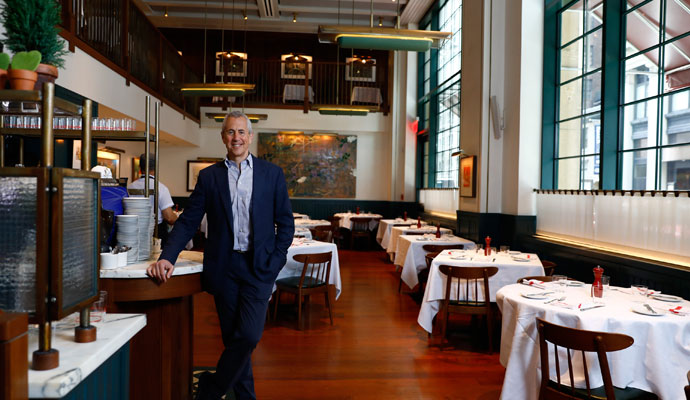Melissa Snover’s Recipe for Sweet Success
The “head magician” at Katjes Magic Candy Factory talks about custom candy, serial entrepreneurship, technology, and the growing pains of startups.
This interview is part of the Inside the Mind of the CxO series, which explores a wide range of critical decisions faced by chief executives around the world.
Katjes Magic Candy Factory, based in Birmingham, U.K., does something that no other factory can: make customer-designed sweets using a specially engineered 3D printer. The idea came to Melissa Snover while she was in the process of growing her first confectionary startup, Goody Good Stuff, a pioneer in the market for vegan sweets. Her customers kept asking whether she could make candies in shapes they designed. In 2015, as sales at Goody Good Stuff topped US$1.5 million and suitors came calling, Snover decided to sell the company and start something new.
She spent months disassembling 3D printers and researching how to produce the ingredients that would not only print edible sweets designed by customers on the spot, but also get the requisite health and safety approvals. She used an online startup incubator to connect with people who shared her interests, and she kept at it, even when her prototype printers failed. While working with Goody Good Stuff, Snover had met Bastian Fassin of Katjes, a fellow confectioner from Germany who was intrigued by her ideas and eventually became her partner. She spent three months in Berlin with the company testing out her product before launching the brand in 2016.
Katjes Magic Candy Factory, the trading name of Katjes Fassin UK Ltd., now has three patents and more than 100 printers in the field. The company started as a business-to-business model leasing the 3D printers, licensing software, and ingredients that would allow customers in stores to design bespoke gummy candy. It has since added two more revenue streams: consulting about 3D food printing and marketing to the entertainment industry (which included an appearance at an after-party at last year’s Grammy Awards). The company turned a profit by the 18-month mark, and revenues are forecast to double annually.
Snover is 36, and this is her third startup. Originally from New York, she moved to the U.K. in 2003 to study business at Lancaster University. Her first business was in finance; she sold it after two years to move into consumer goods. In a world where up to a third of all startups fail in their first year, and two-thirds disappear after five years, her success rate is impressive. Strategy+business sat down with Snover to find out what makes a successful entrepreneur and what challenges are facing small businesses that want to operate globally at a time when Brexit and trade wars are dominating the headlines.
S+B: How did you get the business up and running?
SNOVER: I came up with the idea for Magic Candy Factory on the back of my first firm, Goody Good Stuff. Basically, I was making candy in a factory. One of the things that frustrated me the most was that I could never customize anything. I [started this business] because I wanted to allow everyone to enjoy the sensation of creating. I read every book there is on 3D printing. I bought 3D printers, took them apart, put them back together (kind of), threw one out of a two-story window, tore my hair out, and finally launched a prototype and went and worked in a shop to see if people liked it.
S+B: How did you overcome the challenges of growing your business and growing your team?
SNOVER: When you start any new business you are faced with the challenges of limited capital, limited resources, limited time. Finding the right people and also the right funding partners, in order to get you over those bridges, is very difficult.
I was extremely lucky, because I actually found my partner, Bastian Fassin, prior to setting up the business, because he was interested and impressed by some of the other things that I had done. He shared my passion for creating customized candies on demand and for making people into their own Willy Wonkas. Still today, Bastian is like a mentor to me. His business has been in the Fassin family for more than 100 years.
But I worked pretty much on my own for the first six to seven months of this development. I had sold Goody Good Stuff and had some resources to invest. Then, as soon as I knew that we had a real business, I went out to market. I was also extremely lucky to have found three [employees] who are still with me now who literally made the entire thing possible.
S+B: What has been your biggest challenge?
SNOVER: I think that the Magic Candy Factory concept is unique because nobody blazed any trail before us. In comparison to my previous businesses in finance and sweets making, there was no road map for what we’re doing. The biggest challenge, I think, was finding partners in the supply chain that were reliable. When you put your name on a product and it fails in market because someone in the supply chain didn’t deliver, the customer will never know this. You need everyone to do what they say they will do.
When we went to New York for our live TV launch for the U.S. market, the partner promised to deliver 12 printers — but they gave us faulty firmware. We had to stay up, literally, for 72 hours nonstop, basically with tools in a hotel room, fixing them. By the time we got it to market, it worked perfectly, but that really taught me a massive lesson. The other lesson that I learned was, thank God, I have an incredible team who are willing to go that extra mile with me. Without their help, we would have fallen flat on our faces at the first hurdle, and the business would be nothing now.
S+B: How do you continue to innovate?
SNOVER: The Magic Candy Factory was born from innovation. We have this thing about “innovate or die; always in beta,” and I think that’s the life force of the business. The innovations that we drew up for the first-ever printer were super exciting. But we’re already on version six printers and we’re only a couple of years old. We continually innovate, based on what we learn.
In this case, being small helps. A bigger company might recognize a design flaw or something that could be optimized, but it could take anywhere from six months to several years to action that knowledge. We 3D print a lot of our parts for our 3D printer, and we’re able to make changes to the hardware, and also to the actual offerings, that are installed in each printer in the market in real time.
Our software feeds me information on a daily basis that tells me, for example, that strawberry [is popular] because it’s a New York strawberry festival. Or, guess what, in the Middle East they don’t like selfies, or in China they totally love selfies. We’re able to trial different items, different flavor profiles, and different concepts around the machine. Then we’re able to actually act on that [immediately], which makes Magic Candy able to innovate every day. I think that is the lifeblood of innovation.
S+B: What’s your biggest challenge over the next 12 to 24 months?
SNOVER: Magic Candy Factory has really turned a corner in the last couple of quarters, and we are starting to turn over some really, really exciting numbers. One of the biggest challenges we’re going to face in the next 12 to 24 months is how do we basically support that growth? We’ve increased our manufacturing and taken on larger premises so we are all in one place, and we’re increasing our head count too. We are now six people. But we have to constantly be mindful that we don’t lose that beautiful, beautiful culture that we built. Grow, but don’t lose the passion and the uniqueness which is the lifeblood of Magic Candy.
S+B: What’s been your proudest moment since launching?
SNOVER: I’ve got to say, probably the proudest moment was when we launched the concept for the very first time at the 2016 ISM [International Trade Fair for Sweets and Snacks] in Cologne, Germany. This is the largest candy show in the world, with about 50,000 to 60,000 people. They give an award for the best new product innovation of the year. It’s kind of like the Oscars of candy.
The day that we launched, Magic Candy Factory we won that award. I had my entire team with me. We had printers — we were making candy for everyone. We were absolutely blown away by people wanting to see the innovation. Up until that stage, I was still a little bit unsure whether I’d actually be able to make it work. That was an amazing feeling for me to see it pushed over the edge, and to see the response from the public for the very first time.
S+B: Looking back, is there anything that you would do differently?
SNOVER: If I could go back in time and give my previous self a little piece of advice, I would say to myself all along the way, “It’s going to be OK.” Because when you start out, taking on new responsibilities and challenges, you encounter something that you’ve never gone through before. At that moment it feels like the whole world is crumbling. Then as you get older, and you get through more and more of these experiences, you realize that none of them are fatal. That they teach you and they make you better, and that you need to go through them in order to get to where you are. If I could go back and tell my freaking-out self something over and over and over again, it would be, “It’s all going to be OK.”
S+B: What would you tell a young entrepreneur today?
SNOVER: If somebody came to me and wanted to start their own business, the advice that I would give them would be twofold. Find something that you’re really passionate about, because you’ve got to have that passion in order to make it through what is going to be a difficult journey. But at the same time, ensure that you are thinking about the consumer or your end-market user and not yourself.
Don’t develop something just because you think it’s cool and everybody should want it. Develop something that solves a problem in the market or makes someone’s life better, because those kinds of products always have a place. But products being developed for the sake of bragging rights, or because “I like it and everybody else should [too],” don’t usually do well, and there’s a reason for that. Focus on the customer, focus on serving people and making people’s lives better, and you will find a way to get through that path and all the way to success.
S+B: What skills are you looking for to help your business grow and thrive in the future?
SNOVER: Setting up the business here in Birmingham was not by accident. There are three universities within 10 miles that have 3D printing degree programs, so we are really spoiled for choice for trained staff. We make 3D printers and we develop our own software. We do all of our own marketing. We have a huge breadth of different things that we can do inside this one single business unit, which is really unique. So when we go out looking for talent, whether it be 3D designers, marketing assistants, or accounting interns, we get a huge response from the local community.
S+B: How do you go about building trust in what you do as a business?
SNOVER: Building trust, with your consumers and also with your partners, is one of the key things that you have to do to set up a successful business. I’ve been running my own company since I was 23. One of the things that I’ve learned is that you need to go into a room prepared, and you need to think about what the customer wants and focus everything on that. By doing that, and always thinking about how you can deliver the best possible service, product, or goods to [meet] their needs, then you really don’t have many problems in moving ahead and building trust.
S+B: Many respondents in PwC’s 21st CEO Survey mentioned cybersecurity as one of their biggest threats. As the handling of data becomes increasingly important, how do you feel your organization is placed to handle potential cyber-attacks?
SNOVER: As we start to see a lot of these horrible stories come out in the press about the mishandling of data and also the hacking of data, it makes you put a very large spotlight on your own organization, and what you’re doing in order to protect the data of your customers and your employees. Luckily, Magic Candy Factory isn’t very old, so we set the entire company up with these things in mind. The business runs on the cloud, and has very strict data protection policies in place, not just for ourselves here at HQ, but across all of our 3D printers all over the world and across the market.
We have protocols that erase all the data every 24 hours. We have to have these systems because when we work with big retailers, they demand it.
S+B: As you are based in the U.K., what is your view about the effects of Brexit?
SNOVER: This is a bit of an uncertain time, and people are quite afraid about what’s going to happen for their business. A lot of stakeholders and investors are getting frightened. But I think that, actually, in every single type of environment there are always opportunities. There is no reason to overthink certainty. The fact that Magic Candy Factory has developed something truly unique, across three different disciplines and innovations — a unique recipe, the software, and the hardware — and is represented in 20-plus countries already, means that no matter what happens around the world, we’re going to be fine to keep making magic.
“Don’t develop something just because you think it’s cool and everybody should want it. Develop something that solves a problem in the market or makes someone’s life better.”
As the U.K. begins to really get into the nitty-gritty of leaving the E.U., there will be a lot of challenges. We’ve already had to cope with the drop in the currency value. [My company] buys and sells things across many markets, so it affected us a lot. But…as we’re invoicing outward almost always in sterling, it is going to benefit us in the long run. With Magic Candy Factory, we’re extremely lucky because we do something that no one else in the world does, and so we haven’t had to drop our prices. We’re actually seeing healthier margins, which has allowed me to plow more money back into research and development.
The biggest issue that we do feel will affect us will be the movement of goods through borders. But we’re hopeful that [the authorities] will be able to negotiate some sort of a deal where that will not become a huge problem for us in the future. One of the things that we’ve done is set up business units in different areas, in the United States and also the E.U.
S+B: What’s next for Katjes Magic Candy Factory? Will you go into mass manufacturing of 3D printers or another new business? As a serial entrepreneur, are you already looking to sell off the business?
SNOVER: A mass market for 3D printers is not yet practical or helpful for us. That would mean 3D printing in the home and we are not there yet, primarily because of cost. But I do have more ideas for the company. Innovate or die is up on our wall. From a technological viewpoint, this business has a lot more [potential] in it, and there are a lot of things that we can explore. We are getting people knocking on our door asking about our technology. We have something that is unique and I think that gives us opportunities. We’re now working on the concept of personalized nutrition, for example — also based on 3D printing — and I hope to have something launched this summer. There are a lot of opportunities that we still have to explore. I believe in Britain as a place to innovate. I could be anywhere, but l love Birmingham.
For more interviews exploring the critical decisions today’s chief executives face, see Inside the Mind of the CEO.




